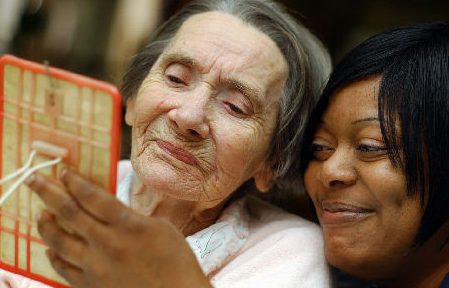
Racial Disparities in End-Of-Life Conversations
End-of-Life conversations between a patient and a healthcare provider or social worker (also known as advanced care planning) have been described as a critical component of high-quality healthcare for people with serious illness.1,2 Unfortunately, a recent study finds that white people prove much more likely to report having advanced care planning than African Americans.3 Elizabeth Luth, PhD and Holly Prigerson, PhD, of Cornell, compiled the records of hundreds of patients and found that white patients proved 74% more likely to report having advance care planning (69.1% versus 39.8%). On the other hand, they also found that advance care planning is associated with more unmanaged sadness and anxiety among African Americans, but not among whites. This paints a more complicated picture about how healthcare (as well as individual families) should respond to this disparity.
The Importance of End-of-Life Conversations
In these conversations, healthcare professionals help patients make informed decisions about the healthcare they want to receive in the future. This improves the delivery of value-concordant care during a very important time. As a result, research shows that end-of-life conversations increase patient and caregiver satisfaction.4,5 The earlier these conversations occur, the more they reduce healthcare spending, improve quality of life, and improve the emotional status of bereaved families (largely through improved use of hospice).6
Myth: Depriving a Patient of Hope
In years past, doctors would often report not having end-of-life conversations with patients due to concerns about damaging the doctor-patient relationship or “depriving a patient of hope.” These are unfortunate myths that may still be affecting quality of care today. Research shows that hospice talks do not help or harm the doctor-patient relationship, do not depress patients, but do result in improved quality of life.7,8
Do African Americans Respond Differently to End-of-Life Conversations?
On the other hand, the research regarding the impact of end-of-life conversations tends to revolve around specific diagnoses, with no adjustment for cultural groups. The work of Luth and Prigerson, published recently in the Journal of Pain and Symptom Management, may be the first to compare the response of African Americans to that of white patients. They reviewed hundreds of old medical records and specifically studied surveys of surviving caregivers of deceased patients. The family caregivers were asked if the patient had sadness or anxiety at the end of life, if it was managed, or if it went insufficiently managed. As per normal, white patients who received advance care planning proved 34% less likely to have unmanaged sadness/anxiety. Interestingly, African American patients who received advance care planning were 160% more likely to have unmanaged sadness/anxiety (15% without talks / 39% with talks). This trend of a negative emotional state associated with advance care planning held across multiple different measures.
What Should be Done About Racial Disparities in End-of-Life Conversations
The research of Luth and Pigerson, reviewing hundreds of old healthcare records, was not structured to glean why these differences existed or if they were causal. The authors suggest that the difference in emotional health outcomes may be a sign of a need for greater cultural sensitivity in advance care planning. For instance, older data suggests African American patients may be more likely to desire aggressive care at the end of life.9,10 Note, such care reduces quality of life while not extending survival. However, the current study shows that African American patients are as likely to receive aggressive care at the end of life as white patients. If the trend from 2003 and 2014 holds true currently, then African Americans should receive more aggressive care at the end of life than white Americans, if their wishes were being honored. The researchers theorize that African Americans may not be receiving end-of-life care concordant with their values, and this may contribute to sadness and anxiety. It would be unclear as to whether this is a correct theory, if it would be caused by cultural differences between patients and their doctors, it would instead be caused by insurance rules, or something else.
The recommendation is that all patients with serious illness or advanced age seek advance care planning from their doctors and other healthcare professionals, and that end-of-life conversations should be occurring with even more patients. The healthcare professionals, for their part, may need to increase awareness of racial disparities that could contribute to sadness or anxiety. Families and patients, especially African Americans, should be informed that there are palliative care services that can help with the sadness and anxiety that sometimes accompanies the last weeks or months of life.
References:
- Tulsky JA. Improving quality of care for serious illness: findings and recommendations of the Institute of Medicine report on dying in America. JAMA Internal Medicine. 2015 May 1; 175 (5): 840-1.
- Sanders J. Finding the right words at the right time—high-value advance care planning. New England Journal of Medicine. 2015 Feb 12; 372 (7): 598-9.
- Luth EA, Prigerson HG. Unintended harm? Race differences in the relationship between advance care planning and psychological distress at the end of life. Journal of Pain and Symptom Management. 2018 Nov 1;56 (5): 752-9.
- Khandelwal N, Curtis JR, Freedman VA, Kasper JD, Gozalo P, Engelberg RA, Teno JM. How often is end-of-life care in the United States inconsistent with patients’ goals of care?. Journal of Palliative Medicine. 2017 Dec 1; 20 (12): 1400-4.
- Brinkman-Stoppelenburg A, Rietjens JA, Van der Heide A. The effects of advance care planning on end-of-life care: a systematic review. Palliative Medicine. 2014 Sep; 28 (8): 1000-25.
- Carpenter JG, McDarby M, Smith D, Johnson M, Thorpe J, Ersek M. Associations between timing of palliative care consults and family evaluation of care for veterans who die in a hospice/palliative care unit. Journal of Palliative Medicine. 2017 Jul 1; 20 (7): 745-51.
- Enzinger, Andrea C., et al. Outcomes of prognostic disclosure: Associations with prognostic understanding, distress, and relationship with physician among patients with advanced cancer. Journal of Clinical Oncology. 2015; 33 (32): 3809-3816.
- Wright A, Zhang B, Ray A, et al. Associations between end-of-life discussions, patient mental health, medical care near death, and caregiver bereavement adjustment. JAMA. 2008; 300 (14): 1665-73.
- Institute of Medicine. Dying in America: Improving quality and honoring individual preferences near the end of life. The National Academies Press, Washington, DC; 2014.
- Degenholtz HB, Thomas SB, Miller MJ. Race and the intensive care unit: disparities and preferences for end-of-life care. Critical Care Medicine. 2003 May 1; 31 (5): S373-8.





